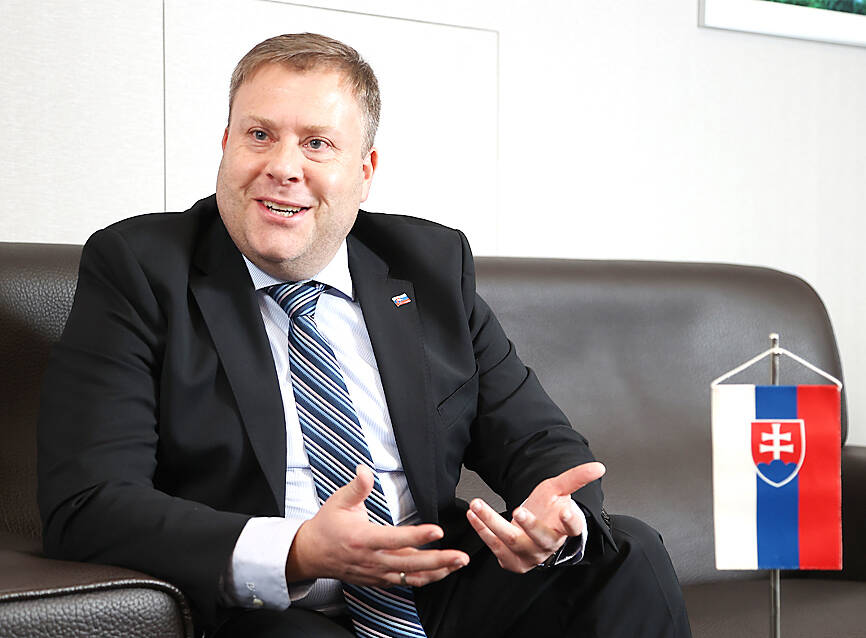Taiwan has been a “true friend” to Slovakia by donating funds and resources that have helped the country cope with Ukrainian refugees fleeing from war, Slovak Representative to Taiwan Bruno Hromy said in an interview.
Russia’s invasion of Ukraine last year has sent millions of refugees fleeing to neighboring countries, including 500,000 who sought safety in Slovakia over a shared 98km border, Hromy said.
“Of course, not all of them stayed. Many of them moved further west, but those who have stayed need to receive support, financial, healthcare and social support, and all this presents enormous, enormous difficulties,” he said.

Photo: CNA
While he is “very proud” of the Slovak people’s sharing of whatever resources they had to support the needs of the refugees, Hromy also gave credit to the help provided by Taiwanese.
“Taiwanese came to help, sending humanitarian aid, sending money,” easing the burden on Slovakia, Hromy said.
“We say in Slovakia: ‘You know the bird by its plumage, you know the person by his deeds.’ True friends will usually help you out in times of hardship, and Taiwan has behaved like a true friend,” he said.
By the first anniversary of the invasion on Feb. 24, Taiwan had donated, through Slovakia and Poland, 27 tonnes of medical equipment, 700 tonnes of humanitarian aid, and more than US$41 million to a relief fund, the Ministry of Foreign Affairs said.
Taiwan and Slovakia had been building strong ties even before the war, with Slovak delegations visiting Taiwan over the preceding years.
Those contacts culminated in a landmark visit by a 43-member delegation led by then-Slovak second state secretary of the Ministry of the Economy Karol Galek in December 2021, despite COVID-19 restrictions still being implemented.
The delegation was in Taiwan to attend the first session of the Taiwanese-Slovak Commission on Economic Cooperation, and during its stay the two sides signed a pact on deepening relations, along with nine other agreements to boost cooperation.
Among the fields covered by the agreements were education, research and development, trade, science parks, space, tourism, smart cities and scientific research.
The fruitful session led to the meeting becoming an annual event, with the second session held in the Slovak capital of Bratislava in December last year, and a third in Taipei to be held in June.
Hromy said the 2021 pact and other agreements have begun to deliver results, citing a special program established by Slovakia’s government to further cooperation on semiconductors.
Meanwhile, Slovak companies have benefited from Taiwania Capital, he said, including Sensoneo, a “smart” waste management solutions provider, and Photoneo, a company that makes 3D cameras and software for use in robots.
Taiwania Capital is a fund established by the government and private sector to create global corporate partnerships through investments, with a focus on technology from Silicon Valley and central and eastern Europe.
The number of scholarships Taiwan has offered to Slovak students specializing in semiconductors, among other fields, has tripled, Hromy said.
The crisis in Ukraine offers an opportunity for ongoing cooperation, suggesting that Slovakia and Taiwan could develop projects in border areas to rebuild the war-torn country, including through their private sectors, he said.
Hromy said he hopes for more cargo and passenger flights between Taiwan and the region to encourage Taiwanese investors and tourists to consider Slovakia as a starting point for operation expansion or European travel.

Chinese spouse and influencer Guan Guan’s (關關) residency permit has been revoked for repeatedly posting pro-China videos that threaten national security, the National Immigration Agency confirmed today. Guan Guan has said many controversial statements in her videos posted to Douyin (抖音), including “the red flag will soon be painted all over Taiwan” and “Taiwan is an inseparable part of China,” and expressing hope for expedited reunification. The agency last year received multiple reports alleging that Guan Guan had advocated for armed reunification. After verifying the reports, the agency last month issued a notice requiring her to appear and explain her actions. Guan

GIVE AND TAKE: Blood demand continues to rise each year, while fewer young donors are available due to the nation’s falling birthrate, a doctor said Blood donors can redeem points earned from donations to obtain limited edition Formosan black bear travel mugs, the Kaohsiung Blood Center said yesterday, as it announced a goal of stocking 20,000 units of blood prior to the Lunar New Year. The last month of the lunar year is National Blood Donation Month, when local centers seek to stockpile blood for use during the Lunar New Year holiday. The blood demand in southern Taiwan — including Tainan and Kaohsiung, as well as Chiayi, Pingtung, Penghu and Taitung counties — is about 2,000 units per day, the center said. The donation campaign aims to boost

The Kaohsiung Tourism Bureau audited six hotels in an effort to prevent price gouging ahead of Korean band BTS’ concert tour in the city scheduled for Nov. 19, 21 and 22 this year. The bureau on Friday said that the audits — conducted in response to allegations of unfair pricing posted on social media — found no wrongdoing. These establishments included the local branches of Chateau de Chine, Hotel Nikko, My Humble House, and Grand Hai Lai, it said, adding that the Consumer Protection Commission would have penalized price gougers had the accusations been substantiated. The bureau said the Tourism Development Act

The Central Weather Administration (CWA) said a magnitude 4.9 earthquake that struck off the coast of eastern Taiwan yesterday was an independent event and part of a stress-adjustment process. The earthquake occurred at 4:47pm, with its epicenter at sea about 45.4km south of Yilan County Hall at a depth of 5.9km, the CWA said. The quake's intensity, which gauges the actual effects of a temblor, was highest in several townships in Yilan and neighboring Hualien County, where it measured 4 on Taiwan's seven-tier intensity scale, the CWA said. Lin Po-yu (林柏佑), a division chief at the CWA's Seismological Center, told a news conference